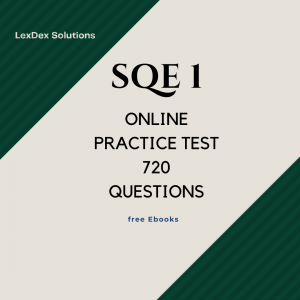Understanding the foundational principles of Land Law is essential for anyone preparing for the SQE1 exam. In this scenario-based discussion, we explore how boundary disputes, outdated planning documents, and buyer responsibilities intersect to form a classic Land Law issue that frequently arises in legal practice.
The Land Law Test Question
Michael recently purchased a parcel of land with the intention to build a residential property. During the purchase, he received several documents from the seller, including an outdated planning permission and an ambiguous map that did not clearly define the property boundaries. After completion, Michael discovered part of the land he believed was his actually belonged to a neighbour, and the planning permission was no longer valid. Michael seeks to claim ownership of the disputed portion, relying on what he thought were the seller’s assurances.
This question tests your understanding of land ownership principles, particularly the doctrine of caveat emptor (buyer beware), the role of due diligence in property transactions, and the legal consequences of misrepresentations and planning permissions.
Watch our detailed explanation of this SQE Land Law question on YouTube below.
Correct Answer Explained
Correct answer: E) No, because the principle of “buyer beware” (caveat emptor) applies, and Michael cannot rely solely on the seller’s documents.
In English land law, the principle of caveat emptor requires buyers to conduct proper checks before completing a purchase. This means the buyer assumes the risk of defects or issues in the property unless specific warranties or protections exist. Michael cannot claim ownership of the disputed land merely based on the seller’s representations or documents provided.
Due diligence responsibility: Buyers must verify the exact boundaries through title investigations and professional surveys before purchase. Here, Michael’s failure to verify the ambiguous map resulted in his misunderstanding of the property extent.
Planning permission vs ownership: Planning permission concerns land use, not ownership rights. Even if the planning permission was valid or invalid, it does not affect the boundary dispute. The land’s ownership depends on registered title and legal boundaries, not planning consents.
Misrepresentation limitation: Although misrepresentations can lead to remedies, they do not automatically grant ownership rights. Michael would need to prove the seller’s intentional or negligent misstatement caused loss, which is a separate claim and does not alter title.
Legal protections for buyers: Unlike some jurisdictions, English law does not automatically protect buyers from boundary errors unless warranties are given or title indemnity insurance is used. Hence, the buyer must be cautious.
By adhering to the caveat emptor doctrine, courts emphasize that buyers must act prudently and seek professional advice when purchasing land.
Key Points to Remember:
Caveat emptor means “buyer beware” – the buyer is responsible for checking property details before purchase.
Planning permission relates to use and development, not ownership or boundaries.
Title and boundary checks should include professional surveys and searches.
Misrepresentation claims may provide remedies but do not alter ownership unless proven and acted upon legally.
The Law of Property Act 1925 and the Land Registration Act 2002 provide the framework for ownership and registration but do not protect against buyer’s negligence.
Why the Other Answers Are Wrong:
A) No, because Michael should have verified the boundaries and planning permissions independently before completing the purchase.
Partly correct: Due diligence is key, but this answer omits the broader legal principle of caveat emptor that places the risk on the buyer. Planning permission is irrelevant to ownership, so focusing on it here is misleading.
B) Yes, because the seller’s representations created an implied agreement that should be honoured.
Incorrect: Implied agreements do not override registered land ownership or formal contracts. Seller’s documents are not binding if they conflict with title deeds or registered boundaries.
C) No, because the outdated planning permission has no bearing on the boundary dispute, and Michael’s claim to the land lacks legal support.
Correctly separates planning permission from ownership, but incomplete: it does not address the principle of caveat emptor or buyer’s responsibility.
D) Yes, because the seller’s misrepresentation regarding the boundaries entitles Michael to claim ownership.
Misleading: Misrepresentation can entitle a buyer to damages or rescission but does not automatically transfer ownership. Legal ownership depends on title and registration, not statements.
E) No, because the principle of “buyer beware” (caveat emptor) applies, and Michael cannot rely solely on the seller’s documents.
Fully correct: This option combines the relevant doctrines correctly and places responsibility on the buyer, as the law intends.
General Explanation and Q&A
Q: What is caveat emptor and why is it important in land purchases?
A: Caveat emptor is a Latin phrase meaning “buyer beware.” It places the onus on buyers to investigate property before buying. This principle protects sellers from liability over undisclosed defects unless fraud or misrepresentation is proven.
Q: Can planning permission affect land ownership?
A: No. Planning permission regulates land use but does not alter who legally owns the land. Ownership is established through title deeds and registration.
Q: What remedies are available for misrepresentation in land sales?
A: Buyers may seek damages or rescission if misled, but these remedies do not transfer ownership rights. The buyer must prove the misrepresentation caused loss.
Ready to master SQE Land Law?
If you found this question insightful and want to deepen your understanding of property law and other SQE subjects, check out our comprehensive SQE1 Online Course and practice test bundles. With detailed explanations, test questions, and expert guidance, you’ll be fully prepared for exam day.
Start your journey to qualification — enroll now!
